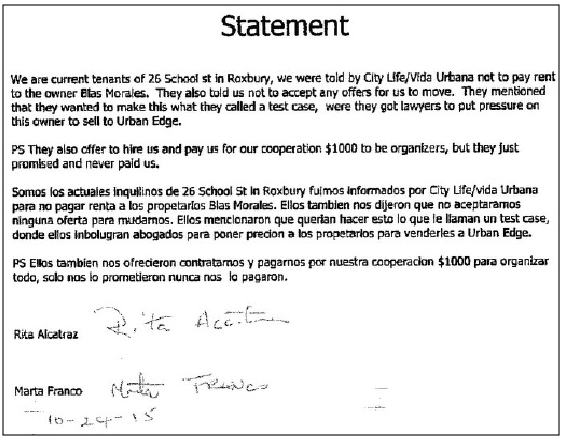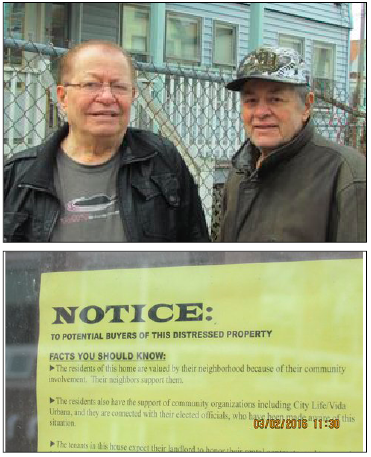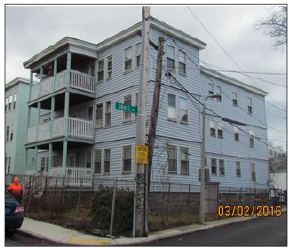Tenant group attacks elderly landlord, devalues his property
| . Posted in Crime, News - 3 Comments
 Do you think we are exaggerating? Will landlords be threatened and coerced under Boston’s “just-cause eviction” proposal? See what you think after reading this story.
Do you think we are exaggerating? Will landlords be threatened and coerced under Boston’s “just-cause eviction” proposal? See what you think after reading this story.
All his tenants were coached to do the free rent trick
As with many small property owners facing retirement age, Blas Cruz, the owner of 26 School Street in the Roxbury section of Boston, and his brother Ismael, the onsite manager living in one unit, planned to sell the six-unit property, their nest egg and home for 30 years. But no small property owner could plan for what would happen just at the point when it came time to sell. In a coordinated assault, Cruz’s tenants would be manipulated and his property substantially devalued, in essence robbing Cruz, an immigrant of Hispanic descent who had won for himself and his brother a modest piece of the American Dream. In no way were they fat cat landlords.
Cruz’s only other property is a two-family in which he lives. The rents have supplemented his income from a job as a teaching assistant in the Boston schools, and the building has given Ismael a place to live. But as Blas and his brother advanced in years, health issues began to mount.
Ismael, 72 years old, began suffering from dementia and required regular assistance from his brother. Blas himself, 68 years old, suffered a stroke in 2014 and walks with a cane and with assistance. The stresses and demands of being a landlord quickly became too much. Cruz finally decided to take advantage of the significant equity he had built up, sell his property, and put the proceeds in his retirement fund.
Tenant advocacy group steps in to drastically lower his property’s value
Who would know that troubles would come from a group whose intent is to bring the American Dream to minority immigrant families – the very constituency that the Cruz brothers belong to. Instead of being able to sell and enjoy his retirement years, Cruz quickly came under attack from City Life/Vida Urbana (clvu.org), the Jamaica-Plain-based tenant advocacy group with a $1 million budget. It was working with Harvard Legal Aid Bureau, a collection of law students who provide free legal representation for tenants in disputes with their landlords.
This partnership manipulated Cruz’s tenants and abused the legal system in an attempt to force Cruz to sell his property at a drastically reduced price to a buyer of their choosing. Who? Urban Edge, a local nonprofit that would turn the property into “affordable housing.” Much value would be stolen from a private owner who has himself for 30 years rented two- and three-bedroom units at very affordable rents, currently at $800 and $900. Should landlords like this be attacked and run out of the market, or encouraged to keep operating as they have been?
Will it be threats of financial loss? SPOA has repeatedly maintained that the “just-cause eviction” proposal will bring tenant advocacy groups into the “mediation” hearing (they are officially invited), who will threaten owners with rent withholding (the “free rent trick”) and rent strikes by all an owner’s tenants in a building – and do it, if necessary. These threats will coerce owners to give up rent increases exceeding 5% because a rent strike and the huge eviction battle it would entail would wipe out any gain from a rent increase. In the proposal’s language, tenants and advocacy groups would have the following rights:![]()
With rent increases effectively capped at 5%, no capital improvements can or will be done. Tenants want low rents, not improvements to someone else’s property. 79% of Boston’s rental housing will steadily deteriorate.
A Harvard Legal Aid Bureau letter to the attorney for landlord Cruz (also named Morales) reveals a broad “collaboration” or conspiracy to devalue his property so that Urban Edge could buy it at a steeply reduced value.
City Life/Vida Urbana has become an increasingly large presence throughout the city of Boston in recent years, but nowhere have they been stronger than in the Egleston Square neighborhood surrounding 26 School St. From organizing marches to peppering the neighborhood with materials to sending representatives knocking on doors to talk to tenants, City Life has been very effective at reaching the people of Egleston Square and advertising their services.
So it is no surprise that when the tenants of 26 School Street received notices to vacate their apartments in December 2014, their first step was to reach out to the advocacy group. But instead of receiving counseling on potential options for relocation or acting as a mediator for negotiations with Cruz, the tenants were told to immediately stop paying their already below-market rents. In fact, they were told to cut off communications with their landlord entirely and not to accept any amount of money offered to vacate.
Tenants are manipulated in ways not to their best interests
In exchange for refusing to move out, the tenants were assured of months of free rent. This rent strike or “free rent trick” is a common tactic of City Life and other tenant advocacy groups. It gives tenants free use of a property while the eviction process, which can take many months (if not years), resolves. In addition to this free place to live, the tenants were promised to be paid $1,000 as hired “organizers” for City Life, a promise that was never fulfilled.
At this point, it is unclear whether Urban Edge, the nonprofit builder, was involved in planning this strategy or knew of these offers undertaken in their name. Urban Edge has declined to comment or respond to any inquiries.
In conjunction with their instructions to the tenants, City Life brought in Harvard Legal Aid Bureau to level a lawsuit against Cruz, citing the condition of the units as the basis for the withheld rent and demanding further damages.
Inspector cites every possible code violation, grossly inflates $$$ damages
City Life called on the aid of private housing-code inspector Ethan Mascoop, who regularly handles inspections for Harvard Legal Aid Bureau and Greater Boston Legal Services. Mascoop claims to have found 120 violations in total across the five units at 26 School Street, with estimated damages assigned to each unit. These alleged damages are amounts owed to the tenants for the supposed reduced value of their units because of the code violations. The current reduced rents already reflect, in part, the actual condition of the units. But, no, they are to be further reduced by the code violations. The damages for the code violations are brazenly inflated amounts, obviously with the intent to scare an elderly landlord. A few of the typical, blatant claims include:
- $41,040 for one unit’s “cockroach infestation.” All the units were cited for this same violation.
- $1,900 for throwing out a tenant’s barbeque grill without proper notice
- $6,840 for a cracked storm window
- $50,000 to each unit for “emotional distress damages” caused by living in the alleged conditions.

From a purchase and sale agreement” dated Sept 12, 2014, of an offer to Cruz of $1.3 million for his property.
Statement shows tenants realize they are part of a scam & manipulated.
Top: Blas Cruz & brother Ismael. Above: City Life’s sign in window warns potential buyers that tenants will fight eviction.
Cruz says that new boilers, new windows, and a new roof were installed within the last three years. How could the inspector cite “defective roof – living room, kitchen and bathroom ceilings are not watertight” when a new roof had been installed? “Because they made it look like it was leaking,” said Cruz. Or “lack of heat in all areas” when new boilers had been installed? Or other violations like “insufficient amperage (50 amps per unit)” and “failure to provide water sufficient in quantity, pressure, and temperature”? These things are basic to the original building that tenants had lived with for years. Must the owner rewire and replumb the whole house? Or “no covers on outlets” for 6 years when tenants could have easily removed them the day before inspection? “Stains” and “cracks” were frequently cited. Inspector Mascoop was fishing for every possible violation. And he was working not to maintain safe housing, but to assist in City Life’s strategy to reduce the value of Cruz’s property.
Each unit was assessed on average $223,024 in damages, for a grand total of $1,115,118, which Harvard Legal Aid claims is owed to the tenants before any mention of additional legal fees, court costs, or other damages that could supposedly be awarded by a jury. In other words, according to Mascoop, Cruz should have been paying his tenants every month an amount approximately equal to their monthly rent to live in his supposedly squalid and dangerous apartments, not the other way around. SPOA’s executive director, formerly a building contractor, inspected the exterior, the front hallway, and one unit, and despite ordinary wear and tear of no health significance, found these areas in quite good condition. For example, no missing plaster, no hanging light fixtures, no sagging ceilings.
How could this absurd outcome happen? Inspector Mascoop inflated the “fair market value” of each apartment to $1,900 a month instead of $800 or $900, the actual rents, and he made the percentages of the rent he used in his calculations to equal more than three times this inflated rent when they should have added up to no more than 100%. Every step of the way was grossly inflated.
Above and below: Both City Life and Harvard Legal Aid want to stop Cruz’s evictions, in order to block his ability to sell his property at the highest price. They threaten to ruin him financially if he continues the evictions.

The 6-unit Cruz property has 2- and 3-bedroom units at $800 and $900, a bargain.
Damages from code violations are calculated as a percent (20%, 30%) of the rent times the months (72) each violation has existed. Inflating the rent inflates the damages.
City Life and Harvard Legal Aid greatly exaggerate the monthly rental value and low-ball the six-unit property value.
We are not the only ones to wonder about inspector Mascoop’s methods. In a 2001 eviction case, Judge Jeffrey Winik wrote in his decision: “[Mascoop] testified that he has had a long term contract...with [the tenant’s] attorneys (the Legal Services Center in Jamaica Plain) and that [he] has performed over one hundred inspections at their request.... I am not satisfied that his opinions...are entitled to be afforded any significant weight....As a private consultant, he testifies only on behalf of tenants.....Mascoop testified to conditions (cross-metering, drafty windows, defective electrical wiring) that had never been identified by any of the ISD inspectors.” In two decisions in 2008, a Housing Court judge said almost the same thing about Mascoop. He is a puppet of tenants and legal services lawyers.
Landlord is scared by threat of over $1 million in damages owed tenants
Nevertheless, for a landlord unfamiliar with landlord-tenant law, Mascoop’s dollar amounts in damages were staggering. But they are far from realistic. In fact, according to a study of 8,091 eviction trials by MassLandlords.net, only in 0.4% – less than 1% – of cases was a tenant awarded damages exceeding the amount of their withheld rent. In other words, in almost all “free rent trick” cases, the landlords are owed money from the tenants, not the other way around.
Despite the four-in-a-thousand chance of Cruz having to pay any damages, the Harvard Legal Aid student-attorneys continuously cite the near inevitability of over $1 million in losses and certain financial ruin. These calculations go well beyond tough negotiating into the realm of fraud and legal extortion.
Despite these legal difficulties, Cruz still intended to go forward with the sale. He accepted an offer of $1.3 million from an independent investor, conditional upon delivering the property vacant of all tenants. Vacant buildings are worth far more than occupied ones, since evicting tenants can – obviously – be expensive and difficult. Unaware of their strict instructions to not move under any circumstances, Cruz continued trying to work with the tenants on a move-out agreement, but failed. After four successive postponements of a closing date due to the tenants’ refusal to vacate, the buyer for the property learned of the imminent litigation and pulled out of the sale agreement entirely, leaving Cruz with no rental income, continued poor health, and an inability to sell his property.
Having achieved the desperation they sought, City Life and Harvard Legal Aid moved on to the final phase of their plan. Harvard Legal Aid delivered “an offer he couldn’t refuse,” a settlement offer delivered to Cruz and his attorney. Once again, claims of damages are inflated. Then the document goes even further, saying that Harvard Legal Aid and the tenants of 26 School Street “…safely presume that [Cruz] is having a hard time selling the property while occupied.” With this explicit threat of continued litigation and astronomical damages, the student-attorneys have made their final demand.
A potential buyer investigated the situation before deciding not to make an offer. City Life and Harvard Legal Aid have already caused landlord Cruz to lose more than half the value of his property. Are their actions legal? A legal dictionary definition: “Extortion is a crime in which one person forces another person to do something against his will, generally to give up money or other property, by threat of violence, property damage, damage to the person’s reputation, or extreme financial hardship. Extortion involves the victim’s consent to the crime, but that consent is obtained illegally.”




